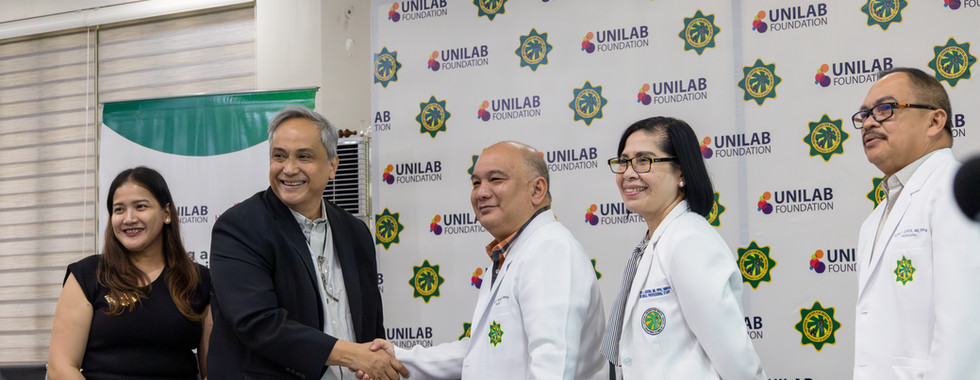NCMH and Unilab Foundation Partner to Pilot School-Based Mental Health Referral System in Mandaluyong
- Kyllie Capacio
- Aug 14, 2025
- 3 min read
Mandaluyong City, Philippines — The National Center for Mental Health (NCMH) and the Unilab Foundation (ULF) are working together to strengthen access to youth mental health care through the rollout of Heads Up Connect Phase 2, a school-based referral and management program. The initiative aims to expand NCMH’s capacity to receive and treat student referrals from partner schools, bridging the gap between classrooms and clinical care.
Formalized at the NCMH office in Mandaluyong, the partnership will kick-off this September with an intensive training workshop for clinicians and allied health professionals on consultation principles, school mental health operations, and clinical skills. This will be complemented by a weekly training course over a 6-month period supporting ULF’s partner schools in their referral needs.
The Growing Need for Access to Mental Health Services
“There are 0.6 psychiatrists per 100,000 Filipinos – that's how scarce we are. Our goal really is to have a breakthrough, to reach many Filipinos – and every breakthrough begins with a clear blueprint,” shared Dr. Noel V. Reyes, Medical Center Chief II of the NCMH.
He highlighted that calls to the NCMH crisis hotline quadrupled since the pandemic, with suicide-related concerns rising from 10% to 35%. Most of these calls come from young people aged 18 to 30 years old, underscoring the urgent need for accessible, youth-focused services.
ULF has already invested in strengthening the school system’s role in mental health through programs such as its universal mental health screening program, Children and Adolescents Risk Screener (CARS), and its gatekeeper program for suicide prevention in schools the RACE Against Suicide (RACE). Both have been adopted by the Department of Education (DepEd) as part of its Learners’ Health Assessment Rollout for SY 2025-2026.
“But that leaves us with the question – who do they refer to?” said Dr. Kenneth Ross Javate, lead author of the Heads Up Connect manual and RACE Against Suicide (RACE).

A Replicable System of Best Practices
Republic Act 11036 or Mental Health Act mandates educational institutions to “develop policies and programs for learners, educators, and other employees designed to raise awareness on mental health issues, provide support for individuals at risk, and facilitate access of individuals with mental health conditions to treatment.” Yet, with most child psychiatrists concentrated in Metro Manila, low-income families continue to face significant barriers to care.
Heads Up Connect Phase 2 addresses this by piloting a multi-tiered, school-linked referral system anchored in NCMH and ULF’s selected partner schools. This model promotes mental well-being for all students, identifies learners at risk, and connects those requiring specialized care to professional services. This likewise contributes to strengthening the School-based Mental Health Program pursuant to the Basic Education Mental Health and Well-Being Promotion Act (RA 12080).
With Bayanihan at the fore, Heads Up Connect focuses on training psychiatrists, allied health workers, and school staff to create an effective referral pathway for at-risk students.
“Our teachers and school staff are often the first to see warning signs. With the goal of minimizing delays, this pilot school referral initiative aims to ensure students receive the support they need when they need it most,” said Atty. Jose Maria A. Ochave, Executive Director of ULF. “This program hopes to contribute to DepEd’s 5-Point Agenda, particularly in advancing the wellbeing of learners — ensuring that schools are not just centers of learning, but also safe spaces for healing and growth.”
Laying the Groundwork for Nationwide Scale-Up
With this pilot, NCMH and ULF are laying the foundation for a wider school-based referral system through partnerships and local collaborations between schools and mental health providers for replication.
“The National Center for Mental Health cannot address all these problems alone. As a national hospital, we are taking care of the whole nation so our programs should really address the predominant issues which involve the mental wellness of our population,” Reyes emphasized.
“If we are to build a future that is inclusive and equitable, we must recognize that mental well-being is not optional but foundational,” Ochave added.
###




